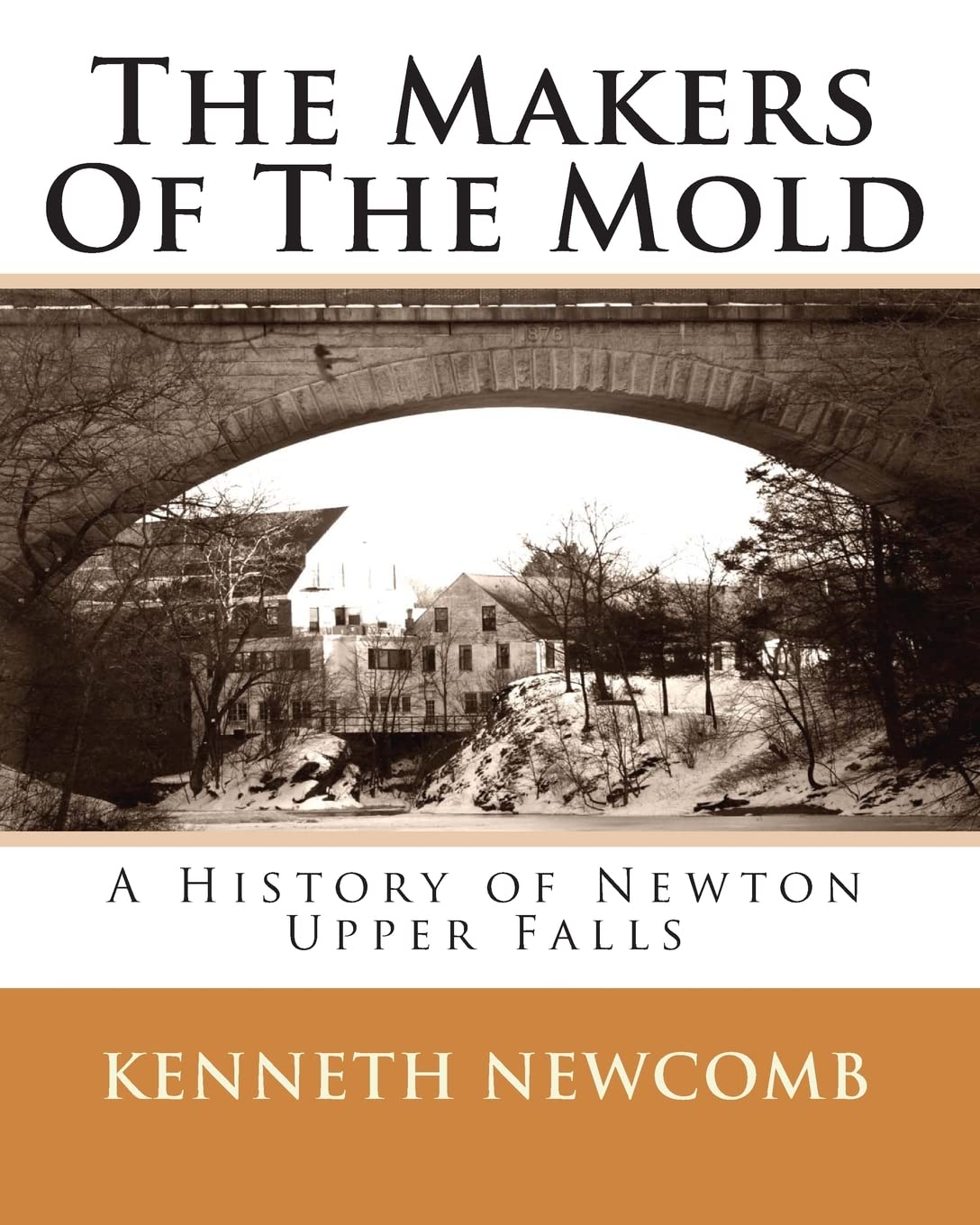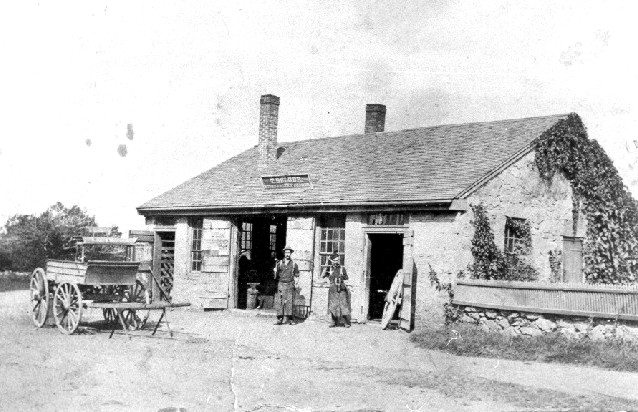Before the First Stores
There is no record of a store in Newton prior to the beginning of the nineteenth century. Its population was a mere 1,491 persons who were scattered over a wide 18 square-mile area. Roads were poor and profits were slim. Some might have journeyed on the few passenger stages available to nearby Boston where they would have found in that city of about 25,000 persons many well stocked stores. However, residents of inland villages containing people of less than moderate means normally did not take advantage of this opportunity, perhaps relying upon the itinerant peddlers who had begun to work their way out from the city into the hinterland. Their heavily laden wagons of tinware, kitchen utensils, ladies’ bonnets, cloth goods and other items soon became a familiar sight on the rural back roads of New England. So welcome were they for their goods and the sharing of local gossip that peddlers had no problem finding lodging for the night in customers’ homes.
Until the village store made its appearance, the tavern was the popular meeting place in the village, second only to the church. The common room of the tavern in those early days was the town’s principal business exchange. It was also the dance hall, theater, convention auditorium, lecture and concert hall. It was in the corner of some tavern’s common room that a village’s first “store” was set up. The wagon supplying the tavern keeper with his regular supply of spirits no doubt found room to handle general merchandise as well.
The First Stores
It is believed that Newton’s first store made its appearance about 1820. Upper Falls was among the first to welcome their appearance when two were opened here about that time.
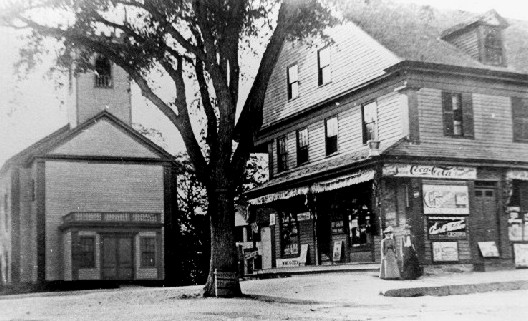
In the 1820s, an “English Goods Store” was operated “on the south side of a road leading from the Worcester Turnpike to Elliot’s Bridge so-called – in the southerly side of the Village called the Upper Falls Village.” It was one of the first stores, if not the first, in Newton. It was owned or leased originally by partners Alvah Kimball and George Sanderson through 1825; to Otis Pettee (the first Postmaster), 1825-1833; Plympton & Clark, 1833-1836; Pliny Ray and Jesse Winslow, 1836-1840; Simeon Grover, 1840-1841; Pliny Ray and Jesse Winslow, 1841-1848. At this point, while the general store remained, the Post Office was removed to the new block built in 1847 at the junction of Elliot and Chestnut Streets, near the Baptist Church. James Taylor (its builder ?) became the Postmaster here in April, 1848. With the move of the Post Office, the ‘center’ of the village shifted with it. No doubt the stage that left the old center in the morning for Boston, via Newton Centre, and returning in the afternoon, shifted its ‘depot’ to the square in front of the new Post Office block. Sometime after 1847 a new building, or addition, was joined to the old Post Office building and had become known as the ‘back’ store.
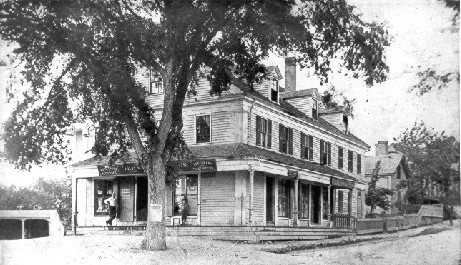
The new combined structure was occupied by two separate stores. The writer can recall when the rear section was occupied by O’Hara’s Meat Market and the front store by a Chinese laundry. It is believed offices occupied the second floor. During the time the ‘back’ store housed only one store and the post office, it is believed a ‘hay scale’ occupied the area in front of the building as it is known that there was one in the area at that time. Hay and coal scales were very important as the horse at that time was the main provider of transportation for homeowners and businessmen alike, and coal began to be the fuel of the times.
In 1854 Dr. Joseph Huckins Warren, son-in-law of Joseph C. Everett, purchased the combined building and had his office there. However, he sold the property in 1859 and later moved to Dorchester, eventually becoming the personal physician to President Lincoln during the Civil War. Do we see some influence exerted here by J.C. Everett’s cousin, Edward Everett, who had become a personal confidant to President Lincoln? (See under THE PEOPLE).
In The Old General Store
An interesting story is told about an incident in the old general store by John Winslow whose home was but a few feet away:
“One winter evening, three school boys, one of whom I was, were sitting around a red hot stove in the village store, then owned, I think, by Plimpton & Clark. While sitting there we took a notion or a notion took us – to try how it would seem to smoke a long nine; I don’t know how it is now, but in those days you could buy a cigar known as the long nine for a cent apiece. So you see, the financial difficulties in our way were not great. We had got the long nines well under way, when to our surprise, perhaps consternation, our schoolmaster, Mr. Barrows, stepped up behind us and in an authoritative manner ordered us to stop that. We did not stop that, but gave him to understand that he was outside his jurisdiction and had no authority to give the order. The good master retreated in disorder, as we did in another sense a few minutes after. We probably smoked a little harder than we otherwise should if we had not raised the question of jurisdiction. I will not speak of what happened to the other boys, but truth compels me to add that in a very short time I could have been seen outside the store in the fresh air looking like a boy uncomfortably at sea. That I may point this tale with a moral, let me add that on reaching home that night I felt a good deal as I suppose the old topers often felt upon returning from a social visit to the old tavern. Not liking to exhibit my demoralized self to the folks at home, I quietly went to bed, and, as I found the next morning, with my boots on. It so happened my good father discovered me in bed the next morning after school time, boots and all on. I have an opinion, not based on fancy, that the old gentleman gave me his poor opinion of my performance, as become a descendant of the Pilgrim Fathers. I never became a smoker for reasons, perhaps, that may be found in part in the displeasure of the schoolmaster as exhibited then and there; also the displeasure of my stomach near that hot stove; also in the displeasure of my faithful father.”
Another early store, also built in the 1820s, was located in an outbuilding of the old tavern house located on the northwest corner of Boylston and Chestnut Streets. It was used by the Baptists for a short time as a meeting place before their church was built.
Some of the Earliest Stores
Later in this section we will add a list of business establishments doing business in Upper Falls at specific periods. The following are those for which some information is available.
- The business of Loring Wheeler, Boot & Shoe Dealer, at the southeast corner of Winter and Chestnut Streets was established in the 1830s. In 1832, after one or two changes in management, it came under the ownership of J.T. Thomason who continued its operation for a number of years as the Echo Bridge Shoe Store.
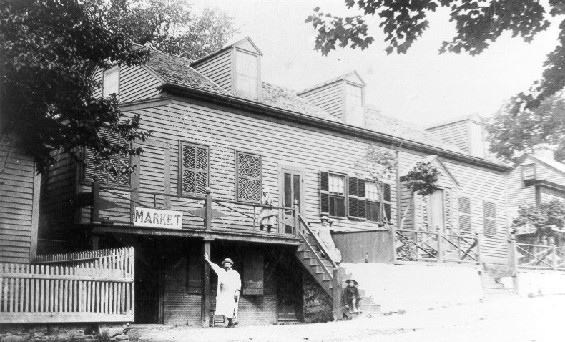
- In the building across the street at the corner of Elliot and Chestnut Streets, the Groceries and Provisions store of H.W. Fanning was established in the 1840s. The Fanning family also had a photography and printing business which was conducted at their plant located at 90 High Street. The grocery business was sold in the 1890s to Edwin Cooper and William Dyson, both natives of England. (At one time William Dyson had a market in the basement of 995 Chestnut Street). The old business block, still doing business housing antique stores and other businesses, was built in 1847. James Taylor, also of England, was either the builder or early owner.
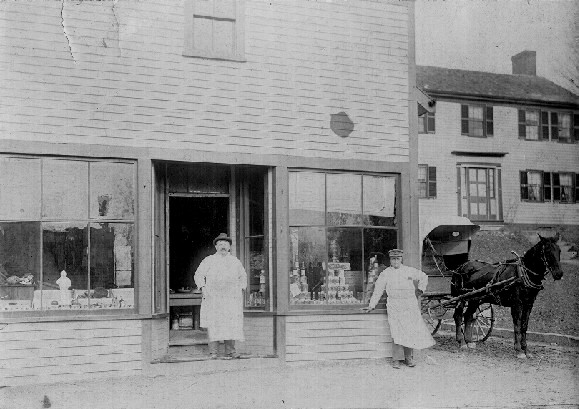
- After the schoolhouse (now 1028 Chestnut Street) was abandoned and picked up at auction by Willard Marcy, it was moved nearer the street and converted into stores.- The first occupant in 1855 was William H. Colburn whose business was “Dealer in Dry and Fancy Goods; Ladies and Children’s Boots and Shoes.” His son, Wm. O. Colburn, continued the business which was later transferred to the Prospect Block when it was built in 1902 at the junction of High and Elliot Streets.
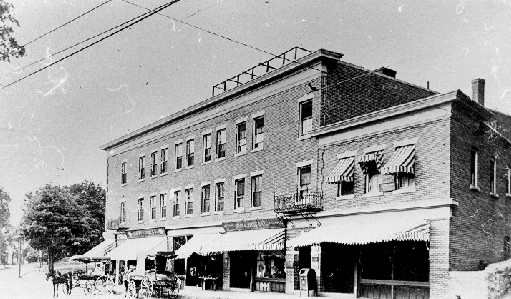
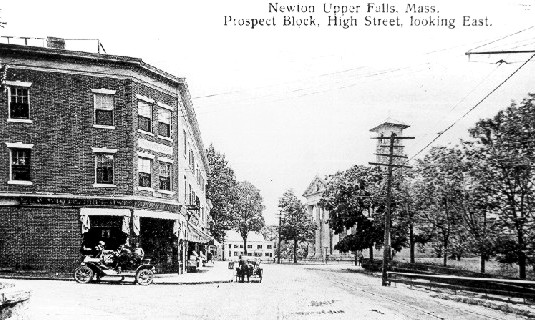
- Other older businesses located in the village in the 1800s and not previously mentioned would include the grocery, flour and grain business established by A.R. Pitts on Chestnut Street in 1889. Mr. Pitts advertised himself as a “native of Massachusetts.”
- There was also William Lowe, Dealer in Groceries, Dry Goods, Notions, Boots, Shoes, Etc., on Chestnut Street (near Summer).
- In addition to the early store on Boylston Street, already mentioned in connection with one of our earlier hotels, there were two others – a provision store operated by Martin Cunningham on his property in the 1880s, and another store operated by Samuel Piper in his home on the southwest corner of Boylston and Chestnut Street. The store featured pastry and candy and served as a waiting room for passengers of the Boston & Worcester Street Railway. Co., whose tracks passed his doors commencing in 1903. Because of the waiting room status, Piper thought the company would subsidize his operation, but business declined when they failed to do so.
- One of the older and quite popular businesses which was located on High Street, bridging a period from the early 1870s to within the memory of our older residents, was that of the hardware business of J.E. Trowbridge (later as a partnership under the name of Trowbridge & Easterbrook). For a short time this business was in competition with that of Collin Cady, shown previously on a list of businesses located in the village in 1868. Mr. Cady’s business had formerly been located on High Street before moving to the corner of Elliot and Chestnut Streets in the early 1860s. His old tin shop on High Street (on the southwest corner of High and Winter Streets) was destroyed by fire on July 31, 1869.
- The first apothecary or drug store on record is one previously shown of Joseph E. Webster who appears in the first town directory in 1868. His business was in the block at the junction of Elliot and Chestnut Streets. He was succeeded in business in the late 1870s by Bernard Billings who took over both the business and the postmastership.
- Another village store is identified by a news item of January 12, 1894 which read: “Extensive alterations are being made in W.H. Kerivan’s drug store on High Street.” Mr. Kerivan was quite versatile in business as he later operated a grocery store at the corner of Mechanic and Elliot Streets. The drug store of Thomas W. White was mentioned earlier in connection with new occupants of the Prospect Block at the junction of High, Oak and Elliot Streets (See OLD HOUSES AND BUILDINGS).
- Another grocery store operating in the old village which we almost overlooked was that of Oliver G. Billings located on the northwest corner of Oak and Chestnut Streets, near the depot. Originally established by Beriah Billings in 1872, it was taken over by Oliver in 1892. Later the business was acquired by Thomas Ackroyd, still later by Charles Marden. Today a block of modern stores occupy the site. The 1874 city atlas shows that the old property was once owned by Levi C. Wade, who was the former master of Prospect #2 (later Levi C. Wade) School) and later a nationally known lawyer and railroad magnate. The 1868 town directory lists him as a student at the Theological Institution. A later address shows his residence as 1198 Chestnut Street, not far from his business at 1220 Chestnut Street.
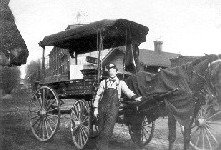
- An early coal and wood dealer in the same area was James Nickelson who conducted such a business including “cement, lime, hair, and Bundle hay, opposite the depot”. This was from his advertisement in 1874, and it is possible that he was a rival to or the predecessor of the similar business of J.W. Mitchell who began selling coal, wood and hay on Oak Street near the railroad in 1886. Mr. Mitchell was a native of Bridgewater who, after operating here for a number of years, purchased a larger business in another state.
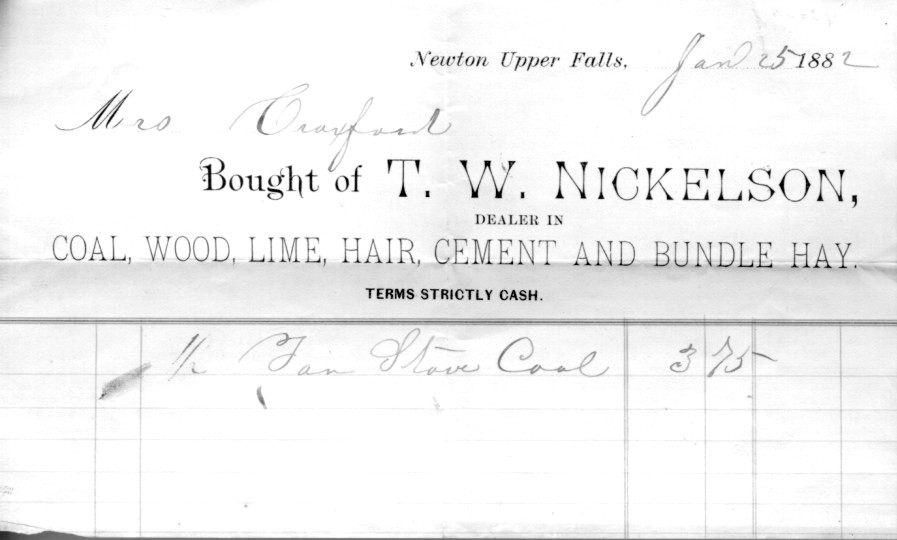
- His successor was Charles Chadwick who continued to conduct a coal business locally and in Needham for over a quarter of a century. Competition for this type of business in the late 1890s and early 1900s was furnished by the Garden City Coal Company located on Mechanic Street near the railroad, and owned jointly by T.R. Coughlin and J.J. Mahoney. (See also TRANSPORTATION – RAILROAD).
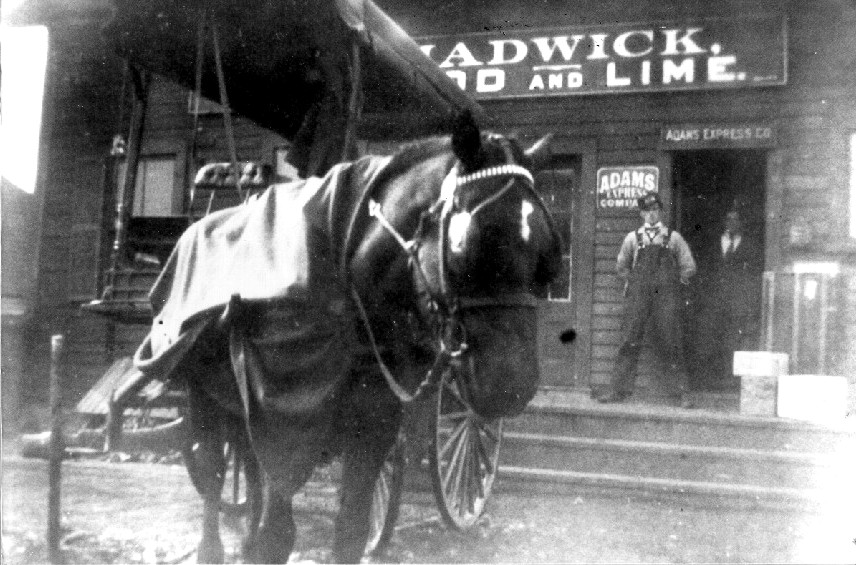
- Serving the aesthetic needs of the local community prior to the turn of the century was Florist GB Randall, whose place of business was on Boylston Street, and who advertised in 1874 that he had for sale “Bouquets, Cut Flowers, Wreaths, etc. Flowers for Weddings, Funerals and Parties.”
- Also advertising locally -a name familiar to older residents:
| Francis Jones, Upper Falls & Boston Express, at Henry W. Fanning’s store Chestnut Street, Upper Falls Lvs. UF — 8 AM Lvs. Boston — 11 AM |
From the outer perimeter of the village these advertisers:
- Sam. N. Woodward, Glue Mfg, Woodward, near Boylston, N.U.F.
- Frederic A. Collins, Glue Mfg. Beacon St. near Woodward, N.U.F.
Note the Upper Falls addresses of the above.
A List of Nineteenth Century Businesses
We will conclude the listing of nineteenth century businesses by including those (other than ones already mentioned) who advertised in the town directory of 1868. Locations within brackets are added by the author:
Early Stores Run by Women
The ladies were part of the business scene also:
| Ellen Thomason, Fancy Goods | Chestnut St. near Winter |
| Anna F. Gould, Dressmaker | Elliot St. near Chestnut |
| Sarah Everett, Nurse | High Street |
| Jane Dailey, Boarding House | Chestnut St. near Elliot * |
* See further details in chapter OLD HOUSES AND BUILDINGS.
Note how many business establishments were located on Chestnut Street, the early main street of the village. There were, of course, innumerable masons and carpenters who have not been listed here.
Twentieth Century Businesses
For contrast we list businesses serving the community in more modern times, when the village was in its heyday. We have selected the 1923 city directory for our source and we will try to give the locations of the merchants in street order:
| Merchant | Location | Trade |
|---|---|---|
| Andrew Mazzone M. O’Keefe Co-operative Grocery Store Harriet Watson Jacob Ehrenfries Querino Quacguarini Joseph Daniele David Berger William Hogg C. H. Bakeman N.U.F. Cash Market Boleslaw Ebel Antonio Vara Perlmutter & Dane Economy Grocery Store Charles Kasrofian Jacob Shear Charles Hagopian Harry Snyder E. E. Gray Co. Thomas E. Ackroyd Levon Ahronian Nestor Kozlenko Cashman & Ginsburg Gaetano Valente H. D. McBride & Co. Great Atlantic & Pacific Tea Co. Andrew J. Hayden Philip Richman Ellis J. O’Hara Frank H. Meacham Giovanni Volpe Tong Lee H. Ryan R Co. James W. C. Easterbrook James K. Hemphill Fanning Printing Co. Witold Lomar Hagop Boghosian George W. Chase Francis Proctor John Proctor Vincenzo Addonizio Thomas L. Aiken Pettee Inn Chadwick Coal Yard Nicholas Tocci Leonardo Giorgeo Tito Passarini Anteras Bedigian Mechanic House | 977 Chestnut Street 898 Chestnut Street 989 Chestnut Street 997 Chestnut Street 985 Chestnut Street 1005 Chestnut Street 1009 Chestnut Street 1012 &1219 Chestnut St. 1016 Chestnut Street 1022 Chestnut Street 1028 Chestnut Street 1030 Chestnut Street 1083 Chestnut Street 1195-97 Chestnut Street 1199 Chestnut Street 1205 Chestnut Street 1209 Chestnut Street 1213 Chestnut Street 1221 Chestnut Street 1217 Chestnut Street 1220 Chestnut Street 1223 Chestnut Street 1201 Chestnut Street 206 Elliot Street 285 Eliot Street 289 Eliot Street 291 Eliot Street 295 Eliot Street 293 Eliot Street 340 Eliot Street 342 Eliot Street 344 Eliot Street 344 1/2 Eliot Street 36 Elliot Street 50 High Street 44 High Street 88 High Street 46 High Street 80 High Street 65 High Street 19 Winter Street 2 Hale Street 64 Pettee Street 301 Elliot 77 Oak Street 107 Oak Street 108 Oak Street 10 Mechanic Street 10 Mechanic Street 38 Mechanic Street 25 Mechanic Street | Grocer Grocer Grocer Baker Shoe Repair Groc, Rest. Variety Store Dry Goods Shoe Repair Fancy Goods Prov. Dlr. Barber Grocer Dry Goods Grocer Restaurant Barber Tailor Shoe Repair Grocer Grocer Conf.- Fruit Prov. Dlr. Grocer Confections / Fruit Dry Goods Grocer Grocer Tailor Provisions Dealer. Knit Goods Shoe Repair Laundry Grocer Hardware Photography Printer Barber Conf. – Fruit Garage Prov. Dlr. Prov. Dlr. Prov. Dlr. Druggist Hotel Coal Barber Tailor Grocer Grocer Boarding House |
The above list does not contain manufacturers, masons, nurses, painters, doctors, clergymen, plumbers, truckmen, piano tuners, dentists, dress makers, contractors, real estate brokers, civil engineers, paper hangers and similar occupations.
Finally, a list of merchants found not to have been included in those previously shown or have recently (through about 1995) been established:
| Merchant | Location | Merchandise |
|---|---|---|
| The English Garden Flower Shop Bob’s Sub Stop Silver Visions Publishing Co. Echo Bridge Restaurant Delerzon’s Drug Store Chinese Laundry Anne’s Beauty Shop Upper Falls Variety Store Never On Sunday Barber Shop Turner’s Radio Service Eurotouch Cleaners Nick’s Pizza Newton Beverage Shops, Inc. Especially for Pets Moon Woman Cafe Legion Barber & Beauty Shop Dunn-Gaherin’s Food & Spirits | 285 Elliot Street 295 Elliot Street 301 Elliot Street 1068 Chestnut Street Elliot St., corner Chestnut 1068 Chestnut Street 1068 Chestnut Street 1195 Chestnut Street 1195 Chestnut Street 1213 Chestnut Street 1213 Chestnut Street 1216 Chestnut Street 1220 Chestnut Street 1223 Chestnut Street 108 Oak Street 110 Oak Street 344 Elliot Street | Various Restaurant Photography Restaurant Pharmacy* Laundry* Beauty* (replaced Turner) |
On The Declining Number of Merchants at the Close of the 20th Century
We would encourage the local reader to form his or her own list and to do some comparing. One drawback is that you will have to be well established in the senior citizen class in order to participate in this exercise.
One question the younger generation will raise is, “How is it that today when the village has a larger population than at any earlier period it is a difficult task to find more than one place where a person could purchase a loaf of bread or a quart of milk within the village limits?”
We offer two reasons. In the old days there were very few residents who owned cars, and today the large supermarkets are outside the village. Remember, too, that there once was a daily doubling of the population by the addition of the out-of-town workers in the mills and other places of employment, providing a considerable number of customers for the merchants.
